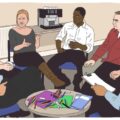What Is Mental Health?
Mental health includes our emotional, psychological, and social well-being. It affects how we think, feel, and act. It also helps determine how we handle stress, relate to others, and make choices. Mental health is important at every stage of life, from childhood and adolescence through adulthood.
Over the course of your life, if you experience mental health problems, your thinking, mood, and behavior could be affected. Many factors contribute to mental health problems, including:
- Biological factors, such as genes or brain chemistry
- Life experiences, such as trauma or abuse
- Family history of mental health problems
Mental health problems are common but help is available. People with mental health problems can get better and many recover completely.
Early Warning Signs
Not sure if you or someone you know is living with mental health problems? Experiencing one or more of the following feelings or behaviors can be an early warning sign of a problem:
- Eating or sleeping too much or too little
- Pulling away from people and usual activities
- Having low or no energy
- Feeling numb or like nothing matters
- Having unexplained aches and pains
- Feeling helpless or hopeless
- Smoking, drinking, or using drugs more than usual
- Feeling unusually confused, forgetful, on edge, angry, upset, worried, or scared
- Yelling or fighting with family and friends
- Experiencing severe mood swings that cause problems in relationships
- Having persistent thoughts and memories you can’t get out of your head
- Hearing voices or believing things that are not true
- Thinking of harming yourself or others
- Inability to perform daily tasks like taking care of your kids or getting to work or school
Talking with a therapist or counselor can help you deal with thoughts, behaviors, symptoms, stresses, goals, past experiences and other areas that can promote your recovery. Of course, talking with a therapist about personal issues can be tough, but it can help you come to grips with problems in your life. It can also offer an emotional release and a sense of really being heard, understood and supported.
Therapy can help you to:
- feel stronger in the face of challenges
- change behaviors that hold you back
- look at ways of thinking that affect how you feel
- heal pains from the past
- build relationship skills
- figure out your goals
- strengthen your self-confidence
- cope with symptoms
- handle strong emotions like fear, grief or anger
- enhance your problem solving skills
Types Of Therapy
There are many different types of therapy, including those that are most effective with families or groups of people. You can learn about your options by talking with people you trust, like your family doctor or clergy, with people who have experience with mental health conditions, or with staff at your local Mental Health America affiliate.
You might ask therapists you’re considering if they use a particular type of therapy and how it works. You may get more out of therapy if you understand how the process usually works and how the therapist thinks it will help you. Some therapists will blend a few different approaches together to suit your particular needs.
The following are a few common types of therapy:
Cognitive-behavioral therapy (CBT) has two main aspects: The cognitive part works to develop helpful beliefs about your life. The behavioral side helps you learn to take healthier actions. CBT often works well for depression, anxiety and bipolar disorder, but it can also be used for other various conditions.
Interpersonal therapy: Focuses largely on improving relationships and helping a person express emotions in healthy ways. This approach often works well for depression. A variation of it called “interpersonal and social rhythm therapy” often works well for bipolar disorder because it also helps develop a daily schedule that supports recovery.
Family therapy: Helps family members communicate, handle conflicts and solve problems better. Forms of family therapy often are used for treating eating disorders and bipolar disorder.
Psychodynamic therapy: Helps people develop a better understanding about their unconscious emotions and motivations that can affect their thoughts and actions.
Art therapy: Can include using music, dance, drawing and other art forms to help express emotions and promote healing.
Psychoeducation: Helps people understand mental health conditions and ways to promote recovery.
For more information on types of therapy, visit the National Institute of Mental Health website at http://www.nimh.nih.gov/health/topics/psychotherapies/index.shtml.
In addition to different types of therapy, each therapist has different amounts and types of training. For example, a psychiatrist is trained in therapy but also has a medical degree and can prescribe medication. A pastoral counselor will include a religious or spiritual approach to treatment. Other therapists may be trained to deal with substance use issues.
What To Expect
Depending on your situation, therapy can be fairly short or longer-term. Often, people see their therapists once a week for 50 minutes. Your first session will be different from future visits. The initial visit is more of a “getting to know you” session and will help your therapist get an idea of how to proceed with your treatment.
You have a right to feel safe and respected in therapy. If you’re concerned, you can ask about confidentiality. Usually, though, it’s understood that a therapist respects your privacy; and that group members do too, if you’re meeting in a group. Therapy should address your needs, goals, concerns and desires. If you’re going to be talking to someone about your most personal thoughts, you want to feel comfortable.
You can think about what traits might make you feel more comfortable with a therapist. For example, would you prefer to see:
- a man or woman
- someone older or younger
- someone from your cultural background
- someone with a style that’s more formal or friendly





